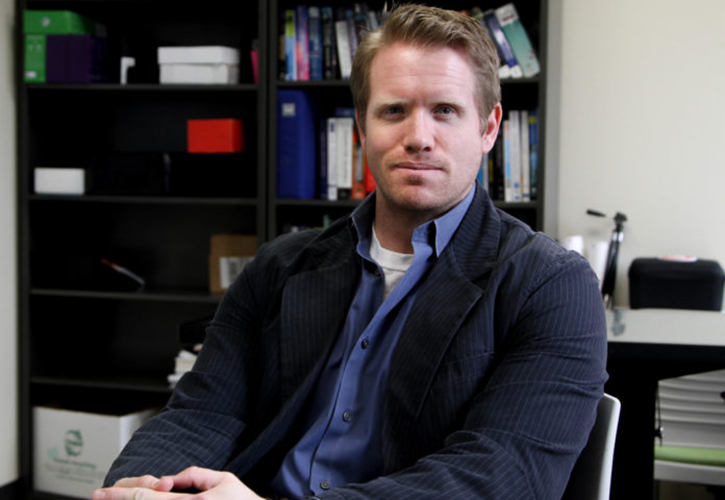College of Arts and Sciences Newsroom

New computer science chair to lead one of UD’s fastest-growing academic programs
By Dave Larsen
Michael Poor, a computer scientist with a passion for improving people’s lives through human-centered design, joined the University of Dayton faculty in July as an associate professor and chair of the Department of Computer Science.
An Ohio native, Poor comes to UD from Baylor University in Waco, Texas, where he was an associate professor and director of the computer science graduate program. He also led the Baylor Human-Computer Interaction Research Group, which focused on the design, evaluation and implementation of interactive computing systems for human use.
Last year, the National Security Agency and U.S. Department of Homeland Security designated the University of Dayton as a National Center of Academic Excellence in Cyber Defense, highlighting the strength of UD’s bachelor of science degree in computer science with a concentration in cyber defense.
Located in the newly renovated Jessie Hathcock Hall, computer science is the fastest-growing major in the College of Arts and Sciences, with 77 new first-year majors for the 2023-24 academic year.
“Our department has been on an upward trajectory for the past five to seven years, including a new Ph.D. program and a large master’s degree program,” said Associate Professor James Buckley, director of UD’s computer science graduate program. “Michael articulated a vision for the department that supports faculty research initiatives in an interdisciplinary environment, assists in the management of our master’s program, and promotes scholarship and external funding. It was obvious to us that he would be a servant leader and welcoming to our diverse student population.”
Poor’s federal research funding includes three National Science Foundation awards totaling nearly $2.3 million, and a $1 million U.S. Department of Health and Human Services grant.
“My research interests are driven by my knowledge of and experience in human-computer interaction, next-generation interaction styles, human-robot interaction and accessibility,” Poor said. “Over the last few years, my research has focused on exploring the interactive space of gesture-based interaction and the impact that a non-traditional interactive medium can have on users suffering from chronic pain.”
In the classroom, Poor’s teaching goals include helping students develop the analytical skills and creative thinking capabilities necessary to thrive in the fast-paced and competitive development world, and to foster understanding of user-centered design and the diverse populations who need to be considered during development.
“While the principles of computer science remain relatively static, the development landscape in which these principles are put into practice is constantly changing as languages evolve and mediums of interaction are introduced,” he said. “My mentorship of graduate and undergraduate students’ research interests not only takes this evolution into account, but strives to shape the understanding of user interaction.”
Poor holds a doctoral degree in computer science from Tufts University and a bachelor’s degree in computer science and psychology from Bowling Green State University in Ohio.
“I am excited about the experience and leadership that Michael brings to one of the University’s fastest-growing academic programs,” said Danielle Poe, College dean. “Michael has the research and administrative experience to elevate the department’s research profile and external research funding. His supportive, motivational leadership style will help mentor a young and growing faculty, and build collaborative relationships across campus and in industry.”
Poor succeeds Mehdi Zargham, professor of computer science, who served as department chair from 2013 to 2022, and Phu Phung, associate professor of computer science, who served as interim chair during the 2022-23 academic year.
Buckley co-chaired the search committee with Associate Professor Zhongmei Yao, research director for UD’s Center for Cybersecurity and Data Intelligence. The committee also included Nick Stiffler, assistant professor of computer science, and Professor Eric Balster, chair of the UD School of Engineering’s Department of Electrical and Computer Engineering.
For more information, visit the UD Department of Computer Science website.
